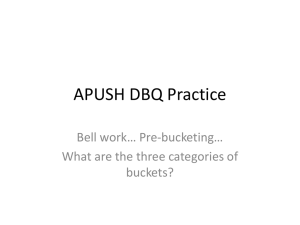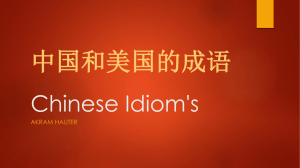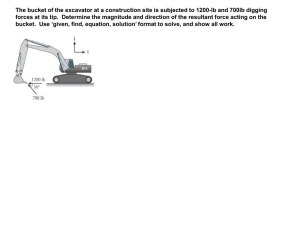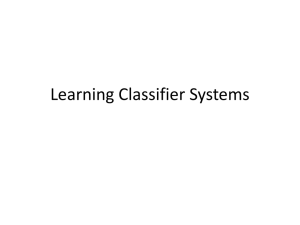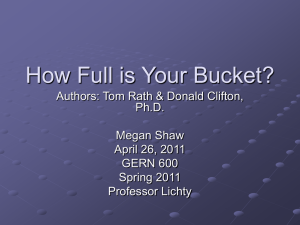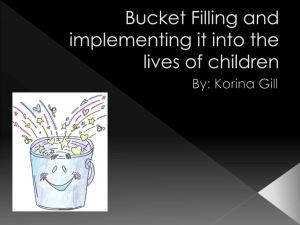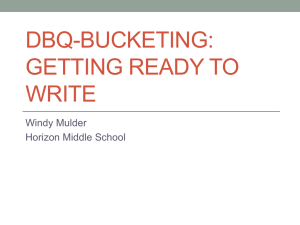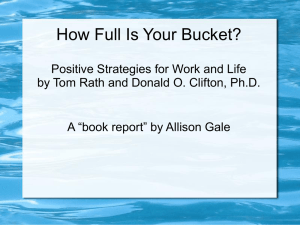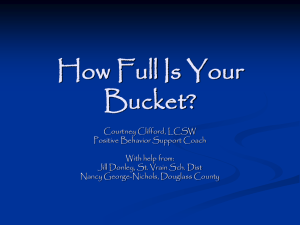How Full Is Your Bucket
advertisement
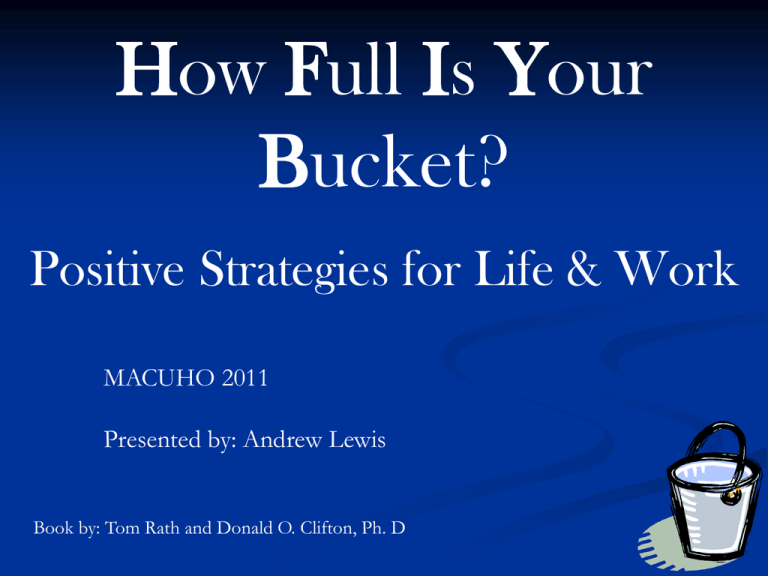
How Full Is Your Bucket? Positive Strategies for Life & Work MACUHO 2011 Presented by: Andrew Lewis Book by: Tom Rath and Donald O. Clifton, Ph. D The Theory of the Dipper and the Bucket Each of us has an invisible bucket. It is constantly emptied or filled, depending on what other say or do to us. When our bucket is full, we feel great. When it’s empty, we feel awful. Each of us also has an invisible dipper. When we use that dipper to fill other people’s bucket – by saying or doing things to increase their positive emotions – we also fill our own bucket. But when we use that dipper to dip from other’s bucket – by saying or doing things that decrease their positive emotions – we diminish ourselves. Like the cup that runneth over, a full bucket gives us a positive outlook and renewed energy. Every drop in that bucket makes us stronger and more optimistic. But an empty bucket poisons our outlook, snaps our energy, and undermines our will. That’s why every time someone dips from our bucket, it hurts us. So we face a choice every moment of every day: We can fill one another’s buckets, or we can dip from them. It’s an important choice – one that profoundly influences our relationships, productivity, health, and happiness. The Magic Ratio • In the workplace, ratios greater than 3 to 1 are significantly more productive than workplaces that do not reach the ratio. • Things can worsen if the ratio goes higher than 13 to 1. • Positive emotions can improve our daily physical and mental well being. 5 Strategies for Increasing Positive Emotions Prevent Bucket Dipping Shine a Light on What Is Right Make Best Friends Give Unexpectedly Reserve the Golden Rule Prevent Bucket Dipping • In each interaction, are you adding or taking from the other person’s bucket? • You start feeling better as well as the others around you. • Can you push the “pause” button? • Convince others that unwarranted negativity only makes matters worse. • Keep track of your interactions and progress. Shine a Light On What is Right • Focus on the positive rather than dwelling on the negative. • Never underestimate the long-term influence of filling others’ buckets. • Positive emotions create chains of interpersonal events. • Every time you fill a bucket, you’re setting something in motion. • If you fill two buckets a day, and the owners of those buckets go on to fill two new buckets, more that a thousands buckets will have been filled at the end of 10 days. If each of those same people filled five buckets instead of two, more than 19 million buckets would be filled in just 10 days. Positive Impact Test Questions 1. I have helped someone in the last 24 hours. 2. I am exceptionally courteous person. 3. I like being around positive people. 4. I have praised someone in the last 24 hours. 5. I have developed a knack for making other people feel good. 6. I am more productive when I am around positive people. 7. In the last 24 hours, I have told someone that I cared about her or him. 8. I make it a point to become acquainted with people wherever I go. 9. When I receive recognition, it makes me want to give recognition to someone else. 10. In the last week, I have listened to someone talk through his or her goals and ambitions. 11. I make unhappy people laugh. 12. I make it a point to call each of my associates by the name she or he likes to be called. 13. I notice what my colleagues do at a level of excellence. 14. I always smile at the people I meet. 15. I feel good about giving praise whenever I see good behavior. Make Best Friends • Most of us have joined and stayed with groups, teams, and organizations because of our best friends. • People with best friends at work have better safety records, receive higher customer satisfaction scores, and increase workplace activity. • Do you have best friends at your workplace? How do you think it effects your work environment? • Your best relationships, began with positive interactions. • Fill a person’s bucket in your very first impression. • Don’t just stop at your first impression, keep it going. • Be the person at work you always notices when someone does a great job. Give Unexpectedly • The vast majority of people prefer gifts that are unexpected. • This gift does not have to be tangible. • Something personal or entrusting a friend with a secret can fill his or her bucket. • Maybe a trinket, a hug, or an offer to grab a cup of coffee. • Even a smile can be an unexpected and cherished gift. Reverse the Golden Rule • Do unto other as they would have you do unto them. • What we recognize in others helps them shape their identity and their future accomplishments. This is why bucket filling must be specific to the individual. • Take a look at the bucket filling interview guide. • How many drops can you give out today? •Not just today, how about when you go back to your institution? •Set a goal! The Bucket Filling Interview 1. By what name do you like to be called? 2. What are your “hot buttons” – hobbies or interests you like to talk about a lot? 3. What increases your positive emotions or “fills your bucket” the most? 4. From whom do you like to receive recognition or praise? 5. What type of recognition or praise do you like best? Do you like public, private, written, verbal, or other kinds of recognition? 6. What form of recognition motivates you the most? Do you like gift certificates, a title for winning a competition, a meaningful note or e-mail, or something else? 7. What is the greatest recognition you have ever received? What will happen? • Your work place will be a lot more productive and fun. • You’ll have more friends. • Your colleagues and students will be more satisfied and engaged. • You’ll enjoy closer relationships with your friends and family. • You’ll be healthier, happier, and well on your way to a longer life. Questions? References Rath, T. & Clifton, D. O. (2004). How Full is Your Bucket: Positive Strategies for Work and Life. New York, NY: Gallup Press About the Authors: Tom Rath is a Global Practice Leader at the Gallup Organization. He has led in the creation of assessment, books, and professional development programs, including the science, technology, and language underpinning the best selling book, Now, Discover your Strengths. Tom holds an undergraduate degree from the University of Michigan and is pursuing a graduate degree at John Hopkins. He lives in Washington, D.C. Donald O. Clifton, Ph.D. (1924-2003) was sited as the Father of Strengths Psychology in a Presidential Commendation from the American Psychological Association. He was a chairman of Gallup, Inc., and he invented the Clifton StrengthsFinder, an assessment that has helped more than 1 million people around the world discover their talents. He coauthored several books, including the bestseller Now, Discover Your Strengths.
